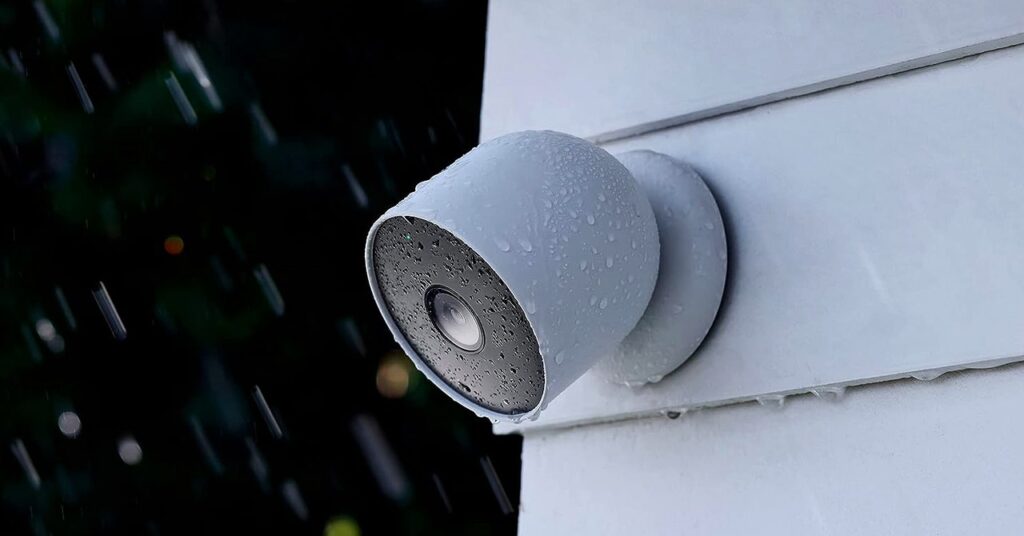Some of our favorite security cameras also come equipped with floodlights. The Arlo Floodlight Outdoor Security Camera ($215) goes up to 3,000 lumens, enough to illuminate a driveway or garden, and doesn’t require electrical wiring, making it easy to install. The Wyze Cam Floodlight Pro ($150) is a more affordable option that also offers 3,000 lumens and has a wide 180-degree field-of-view, but you may need an electrician to install it safely, and there’s no Apple HomeKit support.
The Eve Outdoor Cam ($250) is an option for Apple users seeking a HomeKit camera, though it is pricey and only goes up to 1,500 lumens. If you prefer Google, the Google Nest Cam with Floodlight ($280) is worth considering and tops out at a respectable 2,400 lumens. It’s worth noting that many outdoor security cameras come equipped with less powerful spotlights that can be triggered by motion.
Indoor Smart Lighting
A home shrouded in darkness is a clear signal that no one is inside, but leaving a light permanently on can also tip your hand to would-be thieves. Luckily, smart lighting can mimic an occupied household. Philips Hue even has special automations that use your smart lights to make it look like you are home. You can find this option in the Hue app if you open the Automations tab, tap the plus icon, and choose Mimic Presence. There is also a TV mimicking option in the Hue Labs formula list.
A few other smart lighting manufacturers have similar modes. For example, Wyze has a Vacation Mode toggle in the Settings for its bulbs. But even if your chosen smart lights don’t have a specific mode for when you are away, they can usually be scheduled. By having a few lights turn on and off to mimic your typical routine, you can give anyone watching the house the impression that you are at home. You can have main lights in certain rooms turn on for the whole evening (perhaps from 6 pm to 11 pm) and maybe schedule bedroom lights for an hour (11 pm to midnight) when you typically turn in.
If you don’t have smart lighting, you can get similar scheduling options by using smart plugs to turn regular lamps on and off. The TP-Link Kasa Mini Smart Plug EP10 ($10) is our favorite and has an Away mode that turns the plug on and off randomly during the time you choose to fool would-be burglars.
Sirens and Other Sounds
Noises are often effective in scaring away intruders too. Many security cameras and video doorbells have loud sirens you can trigger. If you get a motion alert when you are away from home and see a suspicious character lurking, then activating the siren might be enough to scare them away. You can also sometimes configure sirens to go off automatically if they determine someone is loitering, but false positives can be a pain.
Barking dogs are another potential deterrent for intruders, but you don’t necessarily need to have a canine chum in the home. You can trigger your Echo speakers to play dog barking sounds when a connected outdoor security camera spots someone or set automatic lights for when you are away for longer. You might even consider scheduling smart speakers to play podcasts or music when you’re away to give the impression people are home. I have guides on creating Alexa routines, Siri shortcuts, and Google Home routines. A smart plug with a radio or TV could achieve a similar effect.
Security Systems and Sensors
The gold standard of security is a remotely monitored 24/7 system, but these are expensive. If you want a security system you can configure yourself, consider something like SimpliSafe (9/10, WIRED Recommends). It offers a range of sensors, cameras, detectors, number pads, and a hub, and you can pick and choose what you need.
You can also piece together a system of your own. I have covered cameras, lights, and motion sensors already, but you may also want to snag some simple contact sensors for doors and windows. I like Aqara’s sensors ($18) as they connect using the Zigbee standard, but they need a hub, such as the pan and tilt Aqara Camera Hub G3 ($110). These sensors are ideal for ground-floor windows and doors, but the range is good enough to fit them on garage and shed doors too.
Now that you have your home sorted, check out our picks of the Best Personal Safety Devices, Apps, and Wearables to keep you safe and secure anywhere.
Special offer for Gear readers: Get WIRED for just $5 ($25 off). This includes unlimited access to WIRED.com, full Gear coverage, and subscriber-only newsletters. Subscriptions help fund the work we do every day.
